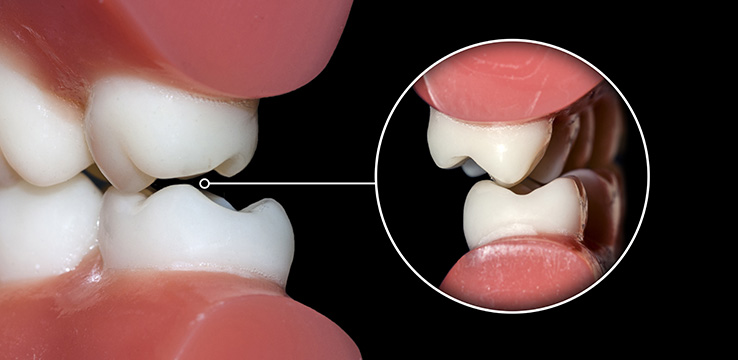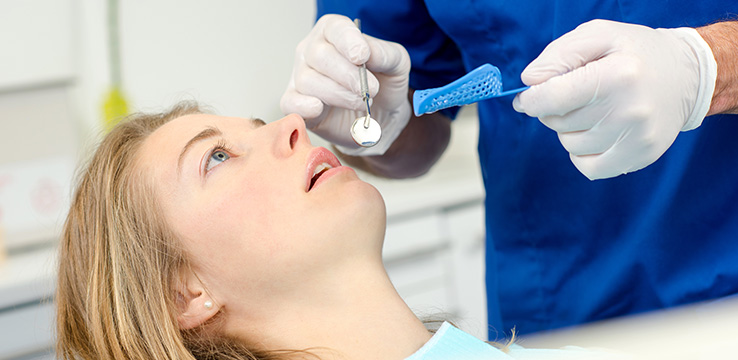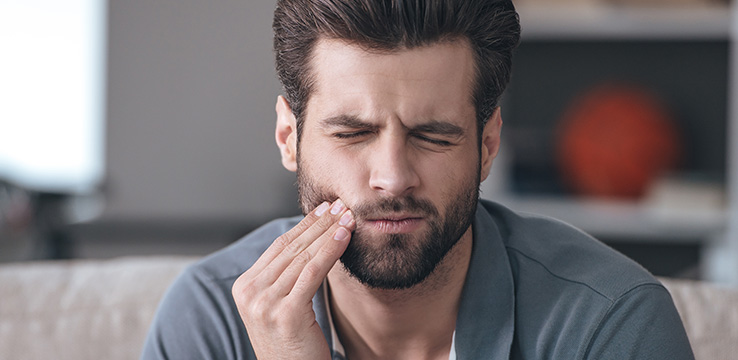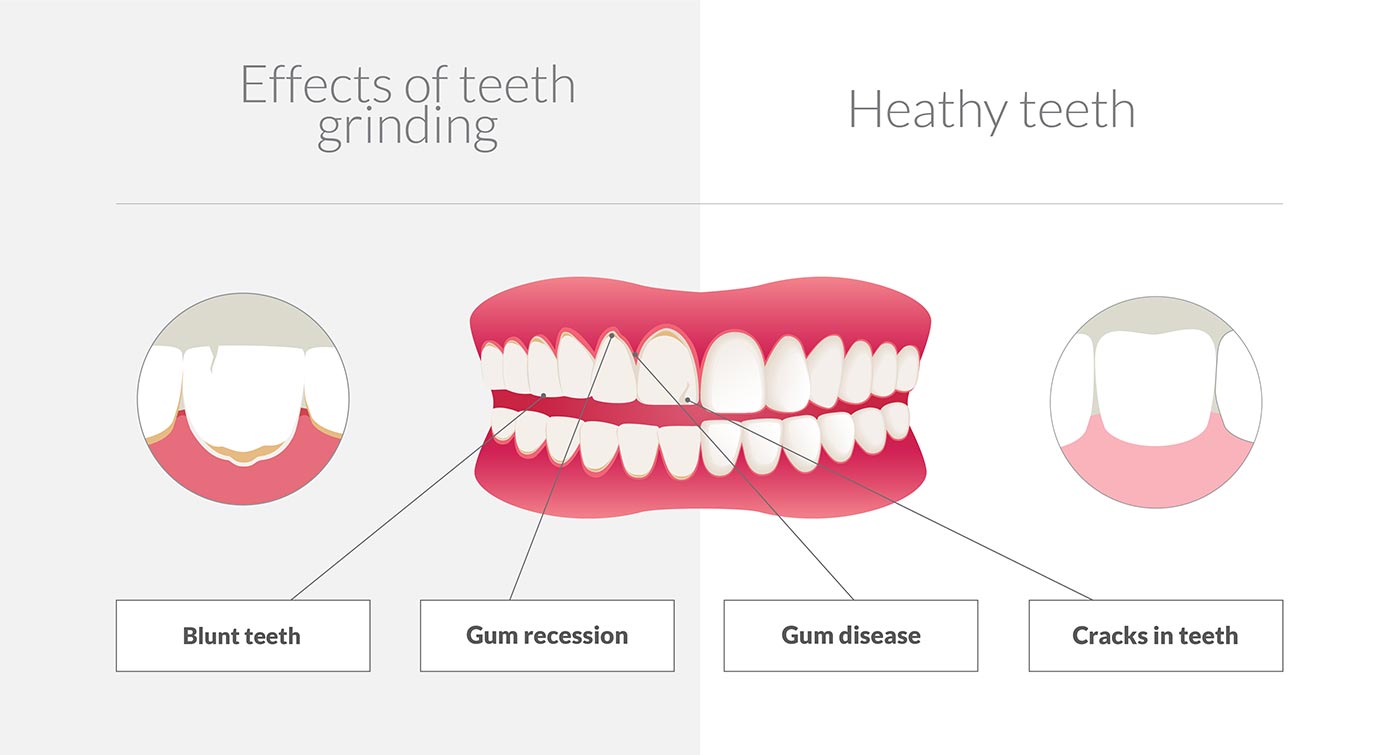
The medical term for teeth grinding is Bruxism. It is the accelerated damage caused by excessive tooth to tooth contact. Bruxism is one of the most commonly known sleep disorders, but because it happens during sleep, many people may be unaware they grind their teeth apart from any side effects they experience. Bruxism happens when your jaw is tightly clamped together, often for long periods of time. The force of the clenched jaw can cause muscle, joint, bone and tooth damage, leading to a range of pain and problems.
How is teeth grinding diagnosed?

Your dentist examines your teeth for any signs of wear and trauma during your regular dental check ups. Bruxism is not immediately diagnosable because there are many factors that can cause tooth and gum wear, including over-vigorous brushing, acidic drinks or abrasive foods. If your dentist suspects you may be grinding your teeth, the situation will be monitored before a treatment plan is set in place.
Symptoms of teeth grinding

Signs and symptoms of teeth grinding vary, depending on the strength of clenching and grinding. People who only clench their jaw may experience tension headaches. Whereas someone else who frequently grinds their teeth may have damage to their teeth and jaw.
The most common symptoms of teeth grinding include
 Tooth pain
Tooth pain
 Teeth are sensitive to heat or cold
Teeth are sensitive to heat or cold
 Tension headaches
Tension headaches
 Facial or jaw pain
Facial or jaw pain
 Waking up with a stiff jaw
Waking up with a stiff jaw
 Difficulty chewing food
Difficulty chewing food
 Teeth start wearing down, even exposing yellow dentine in the teeth
Teeth start wearing down, even exposing yellow dentine in the teeth
 Microfractures in the tooth enamel
Microfractures in the tooth enamel
 Broken or chipped teeth
Broken or chipped teeth
 Restricted jaw movement caused by stiffness in the jaw
Restricted jaw movement caused by stiffness in the jaw
 Pain that feels like a toothache
Pain that feels like a toothache
 Neck pain
Neck pain
 Earaches
Earaches
 Others may notice the grinding noise
Others may notice the grinding noise
Bruxism causes

Why do some people grind their teeth?
Bruxism can occur when a person is awake or asleep. Because it happens subconsciously, you may often unaware that it is happening, even when it occurs during waking hours. Children who experience bruxism grow out of it by adolescence; though it is also common in adults. There are a number of reasons bruxism can occur, including:
Stress
One of the most frequent causes of teeth grinding is stress. Stress caused by work, relationships, prolonged periods of concentration and other lifestyle factors can cause tension, leading to a clenching of the jaw and teeth grinding.
Chronic Pain
Sufferers of chronic physical pain can clench their teeth as a way of dealing with the pain. Chronic pain may be caused by a pinched nerve, inflamed disc in the spine, arthritis or endometriosis amongst other things.
Sleep Apnoea
Sleep disturbances such as sleep apnoea can also cause tension in the jaw. Broken or uneven breathing and sleep patterns can result in painful clenching and grinding of the teeth.
Drug use
Recreational drug use can have an anatomical effect where the muscles of mastication (chewing) or the occlusion (position) of the teeth exaggerate natural mouth movements. Often this manifests in jaw clenching and teeth grinding.
Grinding teeth in sleep
Teeth grinding is one of the most common sleep disorders in both adults and children, occurring most commonly while a person is asleep. Bruxism occurs when our natural chewing reflex does not turn off when we go to sleep. This makes our jaw engage and continue to move, resulting in clenching and grinding of the teeth.
If you are concerned you may be grinding your teeth while sleeping, make an appointment with Dr Wilcox or Dr Cooke at Shore Dental today.
Effects of grinding teeth

Bruxism may be harmless in many cases, however it can have lasting negative effects on your teeth and gums.
Gum Recession
Because of the force on the jaw and teeth, grinding teeth can cause gum recession, tooth damage, and in some severe cases can lead to tooth loss.
Gum Disease
Damaging the teeth can lead to periodontal pockets and cracks in teeth where bacteria and plaque can grow, leading to infection and dental disease.
Occlusal Trauma
Occlusal trauma are cracks that occur in the teeth when the teeth wear down in abnormal patterns, often caused by grinding.
Myofascial Pain
If teeth grinding continues for a prolonged period of time, the teeth can wear down and become blunt. Because this leads to reduced function, it can cause nerve pain, muscle pain in the face and tension headaches.
How to stop teeth grinding

If your dentist suspects you or your child may be grinding your teeth, a number of paths may be taken, depending on your symptoms and the damage caused to your teeth and gums. Treatment usually depends on:
 Age and health
Age and health
 Severity of the symptoms
Severity of the symptoms
 Expectations for the progression of the condition
Expectations for the progression of the condition
There is no one-size-fits-all treatment for bruxism. Once diagnosed, there are a number of different options that may help treat the cause and symptoms:
No treatment
In young children, no treatment is often needed as children usually stop grinding their teeth as they grow older. Some adults do not grind their teeth severely enough to need treatment.
Stress management
Bruxism is often caused by stress and jaw clenching. This can be treated in a variety of ways, including counselling, exercise, meditation, or other relaxing activities.
Mouth guard
When bruxism occurs, especially in children, a dental mouthguard can be used to prevent damage to the teeth and break a grinding habit. Inexpensive rubber mouthguards are not an effective treatment as they become dislodged with teeth grinding. Dental mouthguards however, are designed to be worn each night while sleeping and are therefore more comfortable.
Correcting teeth and jaw position
In some cases bruxism can be the result of misaligned teeth and jaw bones. In this case, orthodontics are used to realign the teeth and improve the bite. In older patients whose teeth grinding has already worn down the tooth surfaces, crowns or bridges are used to reconstruct the shape of the bite.
Muscle therapy
When grinding is linked to the overactive muscles used for chewing and jaw function, dentists can administer botulinum toxin (Botox) into the muscles responsible. This reduces the size of the muscles and their ability to cause damage in the long term.
Behavior therapy
Behavioural therapy and biofeedback are alternative therapies used to reeducate a person on how to hold their jaw, tongue and lips. Changing the way your mouth rests may minimise or eliminate teeth clenching and grinding.
Medications
Medications are not usually used to treat teeth grinding as they are not very effective. In some cases, however, muscle relaxants may be used before bedtime. Bruxism can develop as a side effect to some medications such as antidepressants. In this case the medication may need to be changed.
Patient Case Studies
See examples of real Shore Dental patient case studies in our Smile Gallery.







